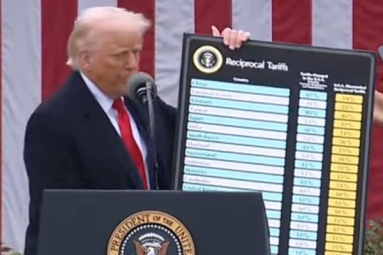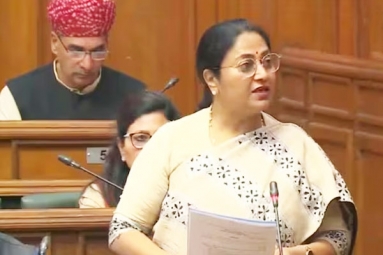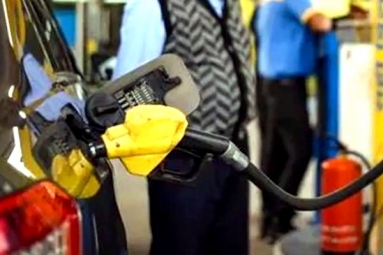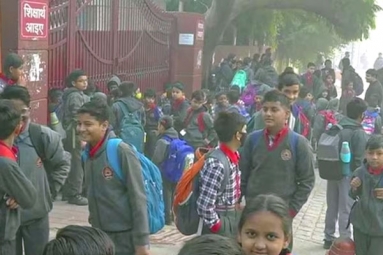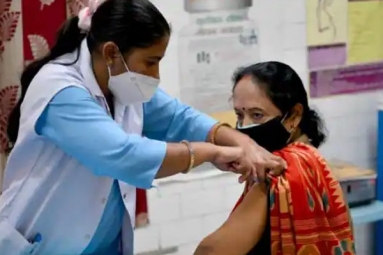
(Image source from: Indiatoday.in)
A report that has been published by the Comptroller and Auditor General of India (CAG) indicates that the previous liquor policy implemented by the now-defunct Aam Aadmi Party (AAP) government in Delhi led to a staggering revenue loss of Rs 2,002 crore. Chief Minister Rekha Gupta presented this report in the Delhi Assembly today, but AAP MLAs opposed the disclosure, resulting in their suspension from the proceedings. The liquor policy scandal, characterized by significant financial misconduct during its development, prompted the arrests of leading AAP figures, including party leader Arvind Kejriwal, his former deputy Manish Sisodia, Rajya Sabha MP Sanjay Singh, and former Delhi Minister Satyendar Jain. The current BJP administration in Delhi has declared its intention to present all 14 pending CAG reports in the ongoing Assembly session.
In the meantime, the CAG report regarding the liquor policy, which spanned the years 2017-18 to 2020-21, highlighted that the Delhi government incurred a revenue deficit of around Rs 890 crore due to its failure to re-tender surrendered licenses. Furthermore, a delay in action resulted in losses amounting to Rs 941 crore linked to exemptions given to zonal licensees. One of the more contentious revelations was a waiver of Rs 144 crore extended to licensees for the period from December 28, 2021, to January 27, 2022, attributed to Covid-19 restrictions. The CAG pointed out that this waiver contradicted the Excise Department's own position, leading to additional revenue deficits. Moreover, mistakes in collecting security deposits from zonal licensees caused a shortfall of Rs 27 crore. The report also cited several other significant irregularities, including:
Issues with License Awarding: The audit determined that the AAP government, led by Kejriwal, failed to enforce Rule 35 of the Delhi Excise Rules, 2010, which prohibits the issuance of multiple licenses. Some retailers held their licenses through the policy's duration while others returned them prematurely. There were no established guidelines for license holders to notify the government in advance before surrendering licenses, leading to interruptions in supply. Additionally, licenses were reportedly issued without verifying compliance with the Excise Terms and Conditions, as stated in the report. The CAG noted, "Licenses were granted without confirming financial solvency, receiving audited financial documents, checking sales data, or investigating criminal backgrounds."
Lack of Price Transparency for IMFL: According to the CAG report, an examination of the pricing and sales of select Indian-made foreign liquor (IMFL) brands revealed that a discretionary ex-distillery price (EDP) system contributed to a decline in sales and subsequent revenue losses. The report explained, "The Excise Department permitted L1 license holders to set their EDP for liquor with prices above a designated level. Nonetheless, subsequent to manufacturing, all pricing elements, including the manufacturer’s profits, were added later." This discretionary power allowed the L1 licensee to manipulate liquor pricing to benefit themselves.
Lack of Adequate Quality Assurance: According to the report, the CAG highlighted several instances where liquor testing reports failed to meet the standards set by the Bureau of Indian Standards. The report noted that essential test reports regarding water quality, presence of harmful substances, heavy metals, methyl alcohol, and microbiological agents were not provided for several brands. It also mentioned that some tests were performed by labs that lacked the necessary authorization. Furthermore, it pointed out that over half of the foreign liquor test reports were either over a year old or lacked a specified date. During a heated session in the Delhi Assembly today, AAP MLAs chanted slogans against the BJP in anticipation of the Chief Minister presenting the report. Consequently, twelve lawmakers, including former Chief Minister Atishi, were suspended for the day.








